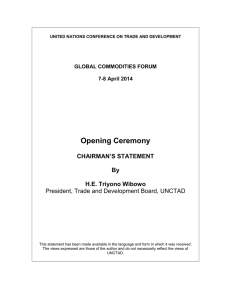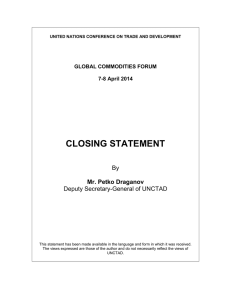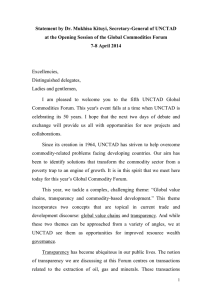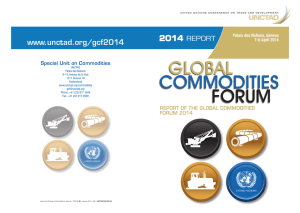Closing Statement By Mr. Joakim Reiter
advertisement
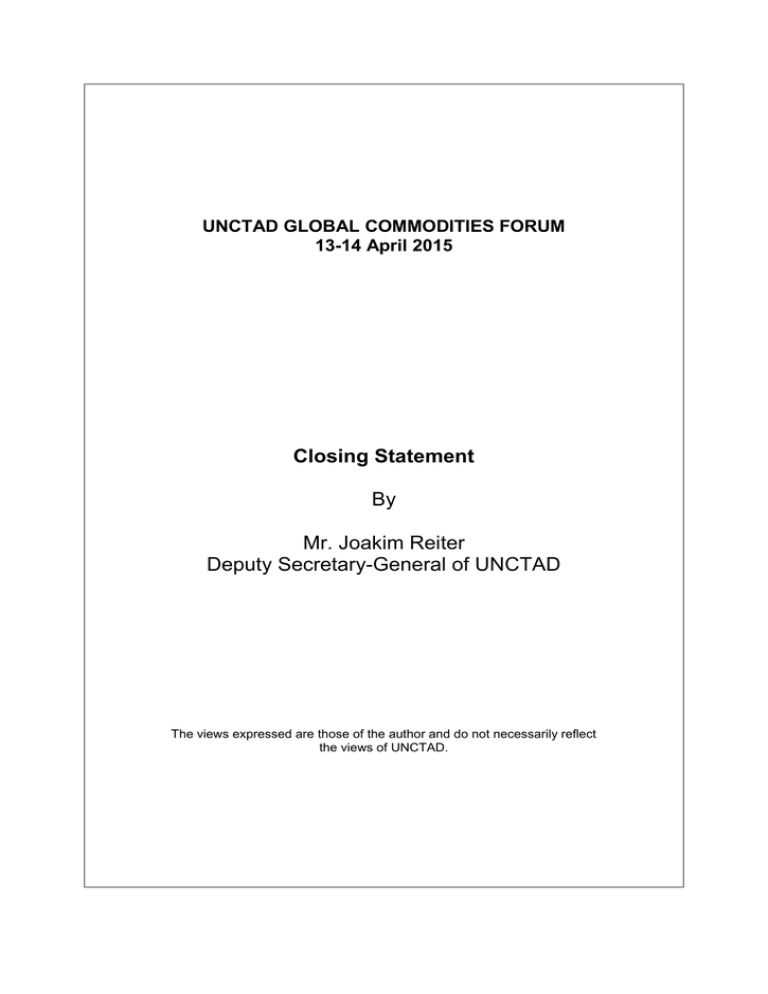
UNCTAD GLOBAL COMMODITIES FORUM 13-14 April 2015 Closing Statement By Mr. Joakim Reiter Deputy Secretary-General of UNCTAD The views expressed are those of the author and do not necessarily reflect the views of UNCTAD. Global Commodities Forum 2015 13-14 April 2015 Closing remarks by Mr. Joakim Reiter, Deputy Secretary-General of UNCTAD Excellencies, Distinguished delegates, Ladies and gentlemen, We have now concluded the plenary programme of the 2015 Global Commodities Forum. And I want to take this opportunity to thank our speakers, moderators and to attendees who contributed from the floor. Their expertise and enthusiasm enriched the debates over the past two days. This year, the Forum's broad theme allowed us to examine five seminar-like topics: 1. Prospects for transparency-themed governance reform in the Swiss commodity trading sector 2. Policy space for resource-rich developing countries in the trade of raw Materials 3. New dynamics in international agricultural commodity trade policies 4. The prospects for renewables in a lower-carbon energy mix 5. End of the supercycle? Implications for development and terms of trade All these topics are very relevant in the current context of a dramatic fall in oil prices, and the modest drop in commodity prices in general. All of them have important implications for development. However, I would like to focus on this occasion on one of the topics where, I believe, UNCTAD can play an important role: transparency in the commodities trading sector. Panellists in the first session of the Forum provided us with rich detail on a number of elements in this debate. Following from this, I would like to describe UNCTAD's vision for the next steps. Above all, the Swiss Government and traders repeated that they want a level playing field. Any new requirements need to be effectively enforced on all competitors, across all jurisdictions. Moreover, incentives and penalties must structure the playing field so that law-abiding firms are not put at a competitive disadvantage Vis-à-vis firms who engage illicit practices to dodge financial obligations across jurisdictions. As we heard in the session yesterday, the Berne Declaration favours the use of legislation and regulation to reform the trading sector. This is a valid opinion, grounded in that organization's extensive research on this subject. But alongside the Berne Declaration, yesterday we also heard the voices of other stakeholders, who are also interested in improving transparency in the trading sector. However, and despite shared high-level objectives, or norms, there remains a significant task of building consensus on how to implement those norms. From that perspective, UNCTAD sees the need for an international, multistakeholder process that harmonizes existing voluntary initiatives and identifies governance gaps for the creation of new, complementary initiatives. This process would have two goals: Establishing the level playing field that companies and governments need to commit without risking their competitive position; AND Building consensus around norms and the tools for their implementation. Such a process would align the current competitive and political realities, allowing for the improvement of norms and the consensus around them - a prerequisite for an eventual passage into, ideally, effective laws. We see a significant opportunity to build an international, multistakeholder process for governance in the commodities sector. The Extractive Industry Transparency Initiative (EITI) represents a firm building block in this process. And at the trading step, currently lacking a specific initiative, traders have expressed their interest in participating, for example with the Swiss sector's dialogue with SECO or the individual efforts by individual companies. We, at UNCTAD, look forward to taking an active role in this process and to capitalizing on the opportunity for collaborative governance reform in the commodities trading sector. Ladies and Gentlemen, We at UNCTAD believe that commodities represent an opportunity for developing countries and I was happy to see this spirit represented in your debates and recommendations. Allow me also to thank our sponsors. Generous contributions from the Government of the People's Republic of China and Afreximbank made this year's Forum possible. In previous years, we received support from the Common Fund for Commodities, the Governments of Switzerland and France, Audit Control and Expertise (ACE) and Gaznat. Thank you also to the World Energy Council - Global Gas Centre for sponsoring our cocktail reception yesterday evening. We are grateful, as ever, to the GCF Steering Committee, a panel of experts in the field who advise us in preparations for the Forum. In closing, thank you again for participating in the 2015 Global Commodities Forum. Have a safe journey home and I look forward to welcoming you at next year's Forum.

